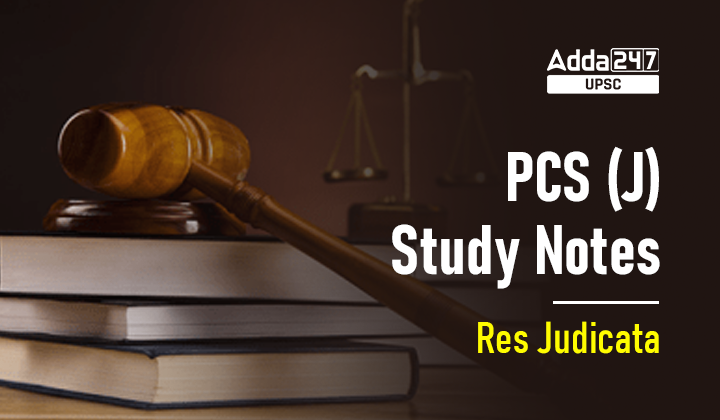Table of Contents
Meaning of Res Judicata
Section 11 of the Civil Procedure Code codifies the principle of res judicata. As you might have guessed, this is a Latin word. adjudicated refers to something that has been evaluated. This means that once a case has been decided, no other court will have jurisdiction over a similar action or problems that were previously resolved in the same case.
There are three tenets upon which the idea of res judicata rests:
- Nemo debet bis vexari pro una et eadem causa: Man should not be punished twice for the same offence.
- Interest reipublicae ut sit finis litium: Settlement of a lawsuit is desirable from a state perspective.
- Res judicata pro veritate occipitur: A judicial ruling is to be upheld as correct.
The idea of finality emphasises that once an action has been decided, the issue at hand is considered to have been resolved and cannot be revisited by the same parties.
Types of Res-Judicata
- Direct res judicata or actual res judicata: This implies a case that has already been settled by the courts cannot be reopened by the same or a different set of parties filing a new lawsuit over the same issue.
- Constructive res judicata: For the sake of fairness, it is essential that a party present all of his evidence related to the issue at hand.
To use the Res Judicata plea, the following must be there:
- Both the suits must be between the same parties or their representative.
- They should prosecute under the same title.
- The matter directly and substantially in issue in both the suits must be related.
- It is essential to ensure that the matter in the former or previous suit was heard and decided.
- The court that decided the previous suit has the competency to decide the subsequent suit.
न्यायिक निर्णय का अर्थ
सिविल प्रक्रिया संहिता की धारा 11 न्याय न्याय के सिद्धांत को संहिताबद्ध करती है। जैसा कि आपने अनुमान लगाया होगा, यह एक लैटिन शब्द है। अधिनिर्णय किसी ऐसी चीज को संदर्भित करता है जिसका मूल्यांकन किया गया है। इसका मतलब यह है कि एक बार किसी मामले का फैसला हो जाने के बाद, किसी अन्य अदालत के पास ऐसी ही कार्रवाई या समस्याओं पर अधिकार क्षेत्र नहीं होगा जो पहले उसी मामले में हल की गई थीं।
ऐसे तीन सिद्धांत हैं जिन पर न्यायिक निर्णय का विचार टिका हुआ है:
- किसी को भी एक ही कारण से दो बार परेशान नहीं किया जाना चाहिए: मनुष्य को एक ही अपराध के लिए दो बार दंडित नहीं किया जाना चाहिए।
- इंटरेस्ट रीपब्लिकएट यू सिट फिनिस लिटियम: एक मुकदमे का निपटारा राज्य के नजरिए से वांछनीय है।
- न्यायिक निर्णय का समर्थन करें: एक न्यायिक निर्णय को सही माना जाना चाहिए।
अंतिमता का विचार इस बात पर जोर देता है कि एक बार कार्रवाई तय हो जाने के बाद, मौजूदा मुद्दे को हल कर लिया गया माना जाता है और एक ही पक्ष द्वारा इस पर दोबारा विचार नहीं किया जा सकता है।
न्यायिक निर्णय को दो में वर्गीकृत
ए) प्रत्यक्ष निर्णय या वास्तविक न्याय न्याय: इसका तात्पर्य है कि एक मामला जो पहले ही अदालतों द्वारा सुलझा लिया गया है, उसी या एक ही मुद्दे पर एक नया मुकदमा दायर करने वाले पक्षों के एक अलग समूह द्वारा फिर से नहीं खोला जा सकता है।
बी) रचनात्मक निर्णय न्याय: निष्पक्षता के लिए, यह आवश्यक है कि एक पक्ष इस मुद्दे से संबंधित अपने सभी साक्ष्य हाथ में प्रस्तुत करे।
न्यायिक निर्णय याचिका का उपयोग करने के लिए, निम्नलिखित होना चाहिए:
- दोनों वाद एक ही पक्ष या उनके प्रतिनिधि के बीच होने चाहिए।
- उन्हें उसी शीर्षक के तहत मुकदमा चलाना चाहिए।
- दोनों वादों में सीधे और पर्याप्त रूप से विचाराधीन मामला संबंधित होना चाहिए।
- यह सुनिश्चित करना आवश्यक है कि पिछले या पिछले मुकदमे में मामले की सुनवाई और निर्णय लिया गया था।
- जिस अदालत ने पिछले मुकदमे का फैसला किया है, उसके पास बाद के मुकदमे का फैसला करने की क्षमता है।



 TSPSC Group 1 Question Paper 2024, Downl...
TSPSC Group 1 Question Paper 2024, Downl...
 TSPSC Group 1 Answer key 2024 Out, Downl...
TSPSC Group 1 Answer key 2024 Out, Downl...
 UPSC Prelims 2024 Question Paper, Downlo...
UPSC Prelims 2024 Question Paper, Downlo...






